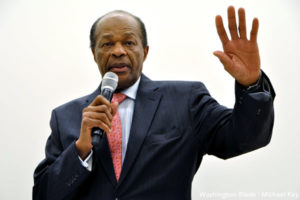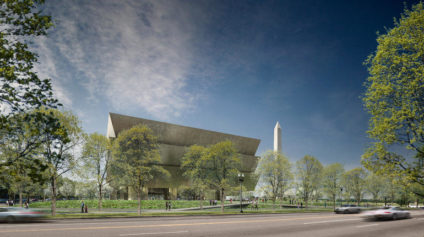
Barry was the most influential D.C. politician in his era. He served four terms as mayor and 15 on the D.C. Council. He was such an enormous and powerful figure that he was considered by residents “Mayor for Life.”
He fought significant personal issues, including prostate cancer, diabetes and kidney troubles. No cause of death was given by the family, which confirmed his passing.
Barry also overcame myriad personal demons. He had four marriages, three ending in divorce. He was separated at the time of his death from his fourth wife. His extramarital affairs and unpaid taxes were city-wide gossip. He also struggled with an addiction to alcohol and drugs, highlighted when he was the victim of a multi-million-dollar investigation that captured him with a woman in a hotel room smoking crack on Jan. 18, 1990.
“The bitch set me up,” Barry was heard yelling as he was arrested.
The arrest and image of Barry using drugs and in handcuffs were spread across the world, and embarrassed the city. But four years later, after six months in prison for cocaine possession and rehabilitation, Barry ran for mayor of D.C. again–and won.
Those outside of D.C. were outraged and could not understand how the citizens could re-elect someone with such a sordid past. But while they could not look beyond the video tape, the people could. And what Blacks saw was a man who connected to them and the city, and who was committed to working for their uplifting.
He was beloved by Blacks in D.C. because he was a beacon for the downtrodden. He insisted on living in Southeast, D.C, which was nearly 100 per cent Black to be “among my people.”
Barry’s summer job programs for youth was a sensation in D.C. for years. He also provided food for senior citizens and purchasing assistance to encourage citizens to seek home ownership. He broke the hiring practices in local government, appointing Blacks in thousands of middle- and upper-level management positions, jobs that whites traditionally felt were theirs.
Frederick D. Cooke Jr., a Barry friend and attorney, said to The Washington Post earlier this year of Barry: “He helped (D.C. government) to diversify to be more inclusive. It had been a stilted, segregated entity, and he made it possible for people to believe they could have a seat at the table.”
Near the end of his final term, however, Barry’s power was usurped by the government amid complaints of mismanagement and corruption and he eased quietly out of public spotlight.
But he lived a big life. Barry adored the attention and admiration that came with being mayor of “Chocolate City.” He flew back with the Redskins when they won the 1983 Super Bowl and was the first off the plane to shake hands with President Ronald Reagan, who was at the airport to meet the champions.
Barry liked the nightlife and all that came with it. He created a contentious relationship with much of the media because he did things his way and often did not like to be questioned about it.
His personal legacy will be that of an embattled man who fought–sometimes successfully, sometimes not–to overcome his troubles. His political legacy will be that of a leader dedicated to the youth and the poor and raising the profile of Blacks in a city he loved.

